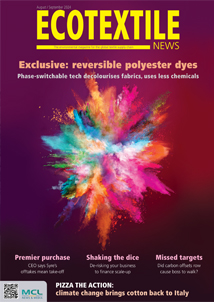SPONSORED CONTENT - In many respects, fast fashion has become synonymous with disposable clothing. According to the Ellen MacArthur Foundation, the average American’s utilization of clothing has decreased 36 per cent in the last 15 years, resulting in nearly 82 pounds of trash – per consumer – each year. This “here today, gone tomorrow” mindset has resulted in an 811 per cent increase in textile waste in landfills since 1960.
With the ever-growing problem of textile waste, the time for long-lasting, sustainable fashion is now. Businesses such as DuPont Biomaterials are developing innovative materials that are built to last and transform the way we work and live. As a product that’s on the forefront of bio-based fibers, Sorona® reflects DuPont Biomaterials’ legacy of meaningful, performance-based innovation, while meeting the needs of environmentally conscious brands and retailers that perform and reform.
Sorona® is a polymer comprised of 37 per cent annual renewable, plant-based ingredients and offers sought-after performance attributes such as stretch recovery, wrinkle resistance, moisture wicking and softness. Its bio-based structure helps to minimize environmental impacts, and can replace Spandex for brands seeking sustainable fabric solutions that achieve permanent stretch and recovery.
Do what moves you
Unique to the Sorona® fiber is its composition - its stretch is mechanical, not chemical. This means the stretch is permanent, maintaining a high level of elasticity and recovery wear after wear, wash after wash. It also maintains its recovery when exposed to heat, UV, or chlorine; and it dries nearly twice as fast as Spandex, making it particularly well suited for swimwear and activewear.
Sorona® continues to perform because its stretch is durable and not impacted by day-to-day use. And with the natural quality of Sorona®, clothing becomes effortlessly soft and endlessly flexible; it moves with you, doesn’t wear out and feels as comfortable as you do in your own skin. This revolutionary fiber is keeping clothing in consumers’ closets and out of landfills, making fast fashion a relic of last season.
Designing a sustainable future
For DuPont Biomaterials, sustainability necessarily includes performance. While bio-based, recyclable and biodegradable ingredients can be key factors critical to reducing environmental impact, if they break down with everyday wear and tear, they’re only part of the solution. Materials need to also have strong performance benefits that will enable garments to be long-lasting – and help limit the growing textile waste issue in landfills.
DuPont Biomaterials’ scientists discovered a way to produce bio-based Propanediol (PDO) – a key building block in Sorona®, turning a formerly chemical process into a bio-based one. On average, the process uses 35 per cent less energy and releases nearly 60 per cent fewer greenhouse gas emissions than nylon. Sorona® is proof that sustainability and performance do not need to be mutually exclusive; they can coexist and elevate one another.
Furthermore, another key differentiator from typical stretch materials is the recyclability of Sorona®. Garments produced using Spandex must have the Spandex fiber separated before the other materials can be recycled, whereas the Sorona® fiber can be recycled in single stream polyester recycling.
Wear it any way you like
Sorona® offers solutions for a number of stretch applications, including swimwear, denim, suiting, intimates, athleisure, sportswear and footwear. And unlike Spandex, the Sorona® fiber is exceptionally soft and dyeable, so it does not need to be woven with another fiber to address issues of texture and opacity.
Better together
DuPont™ Sorona® is furthering its commitment to sustainable and performance-driven apparel by collaborating with industry peers and leading global brands to create the next generation of textile solutions. DuPont Biomaterials is making important strides toward a less wasteful, more circular fashion movement, proving that sustainability and performance can mutually benefit the supply chain industry and consumers.





























































































